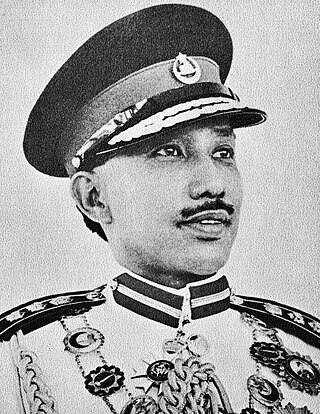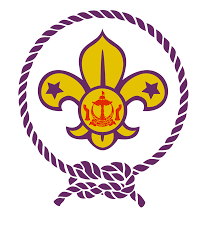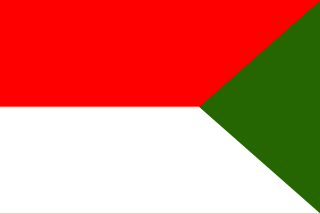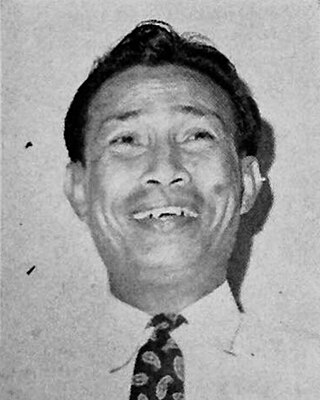
Omar Ali Saifuddien Sa'adul Khairi Waddien was the 28th Sultan of Brunei, reigning from 1950 until his abdication in 1967 to his oldest son, Hassanal Bolkiah.

Tutong District or simply known as Tutong, is the third largest and populated district in Brunei. It has an area of 1,166 square kilometres (450 sq mi) and the population of 47,210 as of 2021. The district is also home to its administrative centre is Tutong Town, as well as the Tutong River and Tasek Merimbun, the country's second longest river and the only ASEAN Heritage Parks in Brunei respectively.

The Brunei Darussalam Scouts Association is the national Scouting and oldest non-governmental organisation in the country, established in 1933. It became a member of the World Organization of the Scout Movement (WOSM) in 1981. The association celebrate its founding on 1 July each year.

Brunei People's Party (BPR), also known as Parti Rakyat Brunei (PRB), is a banned political party in Brunei. The party was established as a left-wing party in 1956 and aimed to bring Brunei into full independence from the United Kingdom. The party called for a constitution that would unite Brunei, North Borneo, and Sarawak under a fully democratic government, the Unitary State of North Kalimantan or Negara Kesatuan Kalimantan Utara (NKKU). However, in 1958 the British publicised their own ideas and rejected the Borneo union ambitions of the PRB, seeking instead for a gradual democratic transformation. The PRB's reactions to both the plan for a Federation of Malaysia and the Constitution of Brunei led to a mutiny in the first part of December 1962.

Marsal bin Maun was a Bruneian politician and educator who served as the second Menteri Besar of Brunei from 1961 to 1962. His tenure was marked by the outbreak of the Brunei revolt in December 1962. Marsal played a pivotal role in establishing both the Brunei Malay Teachers Association (PGGMB) and the Brunei Scout Movement, which continue to thrive today. A prominent figure within the PGGMB, he was also closely associated with Sultan Omar Ali Saifuddien III. He was one of the "three M's" that concerned the British government, alongside Pengiran Muhammad Ali and Pengiran Muhammad Yusuf.

Pengiran Muhammad Yusuf bin Pengiran Haji Abdul Rahim, pen name Yura Halim, was a Bruneian nobleman, politician, civil servant, diplomat, and writer. He served as the Menteri Besar of Brunei from 1967 to 1972. He wrote the lyrics for Brunei's national anthem, "Allah Peliharakan Sultan," in 1947. The song was adopted as the country's official national anthem in 1951, when it was still a British protectorate. He was longtime member of the Legislative Council of Brunei, serving on the council until his death in 2016.

Pengiran Muhammad Ali bin Pengiran Haji Muhammad Daud, commonly known as Pengiran Ali, was a Bruneian nobleman, teacher, and politician. He served as the first Deputy Menteri Besar from 1962 to 1965 and was a member of the Legislative, Executive, and Privy Councils. Pengiran Ali played a pivotal role in Brunei's history, particularly during the 1950s and 1960s. He was the first of the "three M's" feared by the British government, alongside Pengiran Muhammad Yusuf and Marsal Maun. He was also the father-in-law of Princess Amal Nasibah, daughter of Sultan Omar Ali Saifuddien III.

Mohd Salleh bin Haji Masri, pen name H. M. Salleh, was a Bruneian aristocrat, nationalist politician, activist and an experience teacher who was among the founding members of the Brunei Youth Front and Brunei People's Party. Him alongside Yura Halim were considered to be the country's first novelists. He was the initial head of the Brunei Nationalist Movement in the 1940s and 1950s.

Hong Kok Tin was a nobleman, businessperson and politician of Chinese descent that previously was among the appointed members of the Legislative Council of Brunei. He was the company director of Seng Hup Hin & Co. in Kuala Belait.

Pengiran Muhammad Salleh bin Pengiran Anak Haji Muhammad was a Bruneian nobleman, religious figure and politician who formerly held several high-ranking positions which included being a member of the State Council, Privy Council, Legislative Council, and the Chief Kadi. He spent practically his whole life fighting for the advancement of Islam and was well-known for being one of the nation's top religious activists.

Muhammad Yasin bin Abdul Rahman, also known as Yassin Affandi, was a Bruneian politician who served as the president of the National Development Party from 2005 to 2010. He worked with A.M. Azahari during the Brunei revolt of 1962, when they called for the unification of Brunei, Sarawak, and North Borneo (Sabah) under a single administration. Together with other rebels, they directed against Brunei's proposed inclusion in the Federation of Malaysia.

Hasbollah bin Haji Mohammed Daud was a prominent Bruneian businessman and politician who founded the Brunei United Party (BUP) in 1961 to promote Brunei's integration into the Malaysian Federation. Supported by the monarchy, he established the party as a counter to the growing influence of the Parti Rakyat Brunei (PRB), but his political efforts were unsuccessful, including losing the 1962 election for the Sumbiling seat.

Although Brunei attained full independence in 1984, it was able to establish autonomous government in 1959. According to the Constitution of Brunei, the Sultan of Brunei has a great deal of political authority and can reject the choices made by the Executive Council as long as he justifies it in writing. The Privy Council, which counsels the Sultan on questions of compassion, constitutional modifications, and honorific designations, the Legislative Council, which is supposed to consist of both elected and appointed members, and District Councils were also formed under the constitution. As the head of state and religion, the Sultan Brunei is in charge of the legislative, executive, and judicial departments of government. Brunei is a unitary state with a constitutional monarchy. Islam is the recognised state religion.

Zaini bin Haji Ahmad is a Bruneian politician, civil servant and writer who served on the Partai Rakyat Brunei's (PRB) Executive Committee and founding the anti-government newspaper Suara Bakti, he was detained in Brunei, escaped to Malaysia in 1974, participated in the PRB's UN Mission in 1976, and was considered the A. M. Azahari's personal assistant. He and Azahari headed the PRB when the Brunei revolt erupted in December 1962.

Ahmad bin Haji Mohd Daud was a Bruneian aristocrat and civil servant who was the chairman of the Tujuh Serangkai committee from 1953 to 1954, assigned the duty of gathering opinions on the proposed Constitution of Brunei from both rural and urban residents, producing an extensive report, and offering guidance to Sultan Omar Ali Saifuddien III during the writing process. Additionally, he was a member of the Privy Council in c. 1974.

Matnor McAfee was a Labuan-born administrative officer and civil servant in the Government of Brunei who formerly took office as the acting State Secretary from 1972 to 1973 and was a member of the Council of Ministers. He had a distinguished career in government of Brunei, having served in various departments across Brunei before and after World War II.

The Speaker of the Legislative Council of Brunei is a pivotal figure in the governance process, responsible for managing the proceedings and voting within the council, ensuring transparency in legislative decisions. Appointed by the Head of State, the Speaker ranks fourth in the state hierarchy and does not assume the role of interim head of state during transitions. This position is vital for maintaining democratic principles and accountability within Brunei's legislative framework.

The Brunei Malay Teachers Association was founded in 1937 and became a legally recognised nonprofit union with a democratic style of leadership in 1939. The founding members of PGGMB, who are also educators who have earned their degrees from the Sultan Idris Training College (SITC), took the initiative to start the organisation. It broadened its activities following World War II by creating a cooperative to promote Malay involvement in business and was instrumental in the founding of Barisan Pemuda (BARIP), Brunei's first nationalist organisation.

Lukan bin Uking was a Bruneian legislative councillor and Dusun leader from Sungai Damit, Tutong District, widely admired for his leadership qualities and contributions. He was among the few Dusun leaders bestowed with a title, which granted him greater authority within the social hierarchy. This incorporation of Brunei Malay practices, including titles and rank consciousness, marked a shift in traditional Dusun leadership, elevating individuals like him to prominent roles. His legacy is mentioned in works by Matussin Tahir (1986) and Harry (2015), the latter noting his role in representing the Dusun community of the interior during political activities in 1962.





















